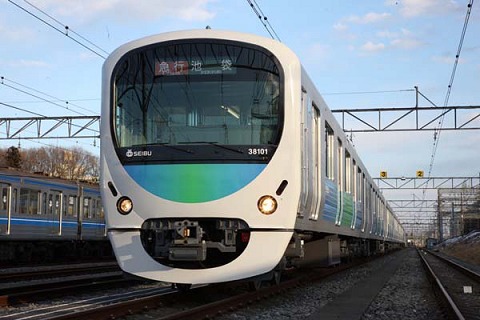Seibu Railway workers steal over 1.55 million yen in rides on other firms' trains
(Mainichi Japan) May 12, 2010
The Seibu Railway Co. announced Tuesday that 19 of its employees had taken more than 1.55 million yen in unpaid train fares using commuter passes to trick the fare system.

30000 faction smile train Seibu employees are given passes that allow them to use all of their own company's lines, but are given commuter pass allowances if they must ride non-Seibu lines to work. According to Seibu, 17 station staff and two conductors were found to have been cheating the fare systems on other companies' lines, using commuter passes only good for short distances at each end of non-Seibu portions of their commute and failing to pay a total of 1,550,810 yen in fares.
The worst offender, who took 1.07 million yen in unpaid rides over three years, purchased two commuter passes -- one for the stop next to the station closest to his home, and one for the stop next to the station where the employee switched to a Seibu line.
Meanwhile, 10 other workers had the system deactivated for such purposes as avoiding ticket gate congestion, and seven helped bypass the system to stop illegal riders. Seibu plans to take disciplinary action against the 36 employees involved, and will seek the unpaid fare amounts from each offender.
At present, automatic ticket gates record the point of entry and exit on a passenger's ticket or commuter pass, and will shut if the ticket or pass is missing that information. Seibu says that it is implementing further measures to avoid repeat offenses, including double-checking commuter passes when they are purchased, and keeping records of anti-cheating system deactivations.
Meanwhile, 12 employees with the Sagami Railway used a similar commuter pass scam to avoid paying train fares, the firm announced Tuesday. A 28-year-old conductor was fired earlier for repeatedly committing a similar offense, and it was recently discovered he had asked two station staff to help him bypass the fare system. The company is now considering disciplinary action.
The Seibu Railway Co. announced Tuesday that 19 of its employees had taken more than 1.55 million yen in unpaid train fares using commuter passes to trick the fare system.

30000 faction smile train
The worst offender, who took 1.07 million yen in unpaid rides over three years, purchased two commuter passes -- one for the stop next to the station closest to his home, and one for the stop next to the station where the employee switched to a Seibu line.
Meanwhile, 10 other workers had the system deactivated for such purposes as avoiding ticket gate congestion, and seven helped bypass the system to stop illegal riders. Seibu plans to take disciplinary action against the 36 employees involved, and will seek the unpaid fare amounts from each offender.
At present, automatic ticket gates record the point of entry and exit on a passenger's ticket or commuter pass, and will shut if the ticket or pass is missing that information. Seibu says that it is implementing further measures to avoid repeat offenses, including double-checking commuter passes when they are purchased, and keeping records of anti-cheating system deactivations.
Meanwhile, 12 employees with the Sagami Railway used a similar commuter pass scam to avoid paying train fares, the firm announced Tuesday. A 28-year-old conductor was fired earlier for repeatedly committing a similar offense, and it was recently discovered he had asked two station staff to help him bypass the fare system. The company is now considering disciplinary action.

No comments:
Post a Comment